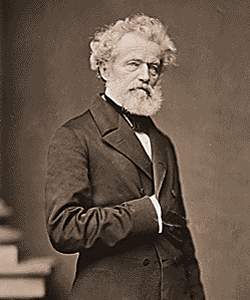John Quitman (American National Biography)
Scholarship
[John] Quitman also played a significant role in state and national military affairs. He helped found, and then captained, a volunteer militia company (the Natchez Fencibles). He served as brigade inspector and major general in the Mississippi militia. During the Texas Revolution, he led Mississippi volunteers into Texas but arrived too late to see action. During the Mexican War, as a volunteer brigadier general in the American army, he won a congressional sword and a promotion to major general for his role at the battle of Monterrey (21-23 Sept. 1846). A year later, General Winfield Scott appointed him civil and military governor of Mexico City in recognition of his heroism at Chapultepec and the Garita de Belén (13-14 Sept. 1847) during the American conquest of the Mexican capital. Later, in Congress, Quitman chaired the Committee on Military Affairs.
A champion of slavery and John C. Calhoun's states' rights theories, Quitman played a central role in Mississippi's nullification movement in the 1830s. While governor in 1850-1851, he opposed the Compromise of 1850 and unsuccessfully urged Mississippians to secede from the Union. In 1852, he ran for vice president of the United States on the Southern Rights party ticket. From 1850 to 1855, he plotted to add one or more slave states to the Union by conquering the Spanish island of Cuba with a privately armed, filibustering expedition. In 1850-1851 and 1854, U.S. authorities prosecuted him for these illegal schemes. The first prosecution caused his resignation as governor of Mississippi. While in Congress, Quitman urged the reopening of the African slave trade and the admission of Kansas as a slave state.
A champion of slavery and John C. Calhoun's states' rights theories, Quitman played a central role in Mississippi's nullification movement in the 1830s. While governor in 1850-1851, he opposed the Compromise of 1850 and unsuccessfully urged Mississippians to secede from the Union. In 1852, he ran for vice president of the United States on the Southern Rights party ticket. From 1850 to 1855, he plotted to add one or more slave states to the Union by conquering the Spanish island of Cuba with a privately armed, filibustering expedition. In 1850-1851 and 1854, U.S. authorities prosecuted him for these illegal schemes. The first prosecution caused his resignation as governor of Mississippi. While in Congress, Quitman urged the reopening of the African slave trade and the admission of Kansas as a slave state.
Robert E. May, "Quitman, John Anthony," American National Biography Online, February 2000, http://www.anb.org/articles/03/03-00408.html.
John Quitman, Filibuster (Freehling, 2007)
Scholarship
Like all the extremists who ultimately made a revolution, [John] Quitman considered southern moderation the barrier to destiny. He saw southern national party politicians as keepers of slaveholders’ prison. In their hunger for national party patronage, politicos dumbed down awareness of the South’s dangerous problems and taught the folk to cherish compromised solutions. Like [William L.] Yancey and all the other ultras, whether they operated inside or outside a national party, Quitman meant to find the issue that would remove the blinders from falsely educated eyes.
Yet what made this charismatic educator so unforgettable was less his success at teaching Southerners to be ultras than his capacity to stay simultaneously northern – to remain a very shrewd and practical operator – even in his highest southern flights. No other southern extremist charged ahead so recklessly – or reconsidered so cautiously. Before his Cuban adventure, this Mississippi governor advocated disunion, in response to the Compromise of 1850. In his typical buccaneering spirit, the governor told South Carolina secessionists to back off for a moment. Then he would lead Mississippi out of the Union first. Skittish South Carolinians gladly obliged. But Quitman, after reconsidering, saw that his pledge had come too soon. So momentum was lost, secession folded, and the chagrined fire-eater learned never to move again until he had the firepower to triumph. By accepting that lesson, Quitman showed he was no [William] Walker, no [Narciso] López, just a shrewd ex-Yankee who sought to make practicality a hallmark of the southern extremist.
Yet what made this charismatic educator so unforgettable was less his success at teaching Southerners to be ultras than his capacity to stay simultaneously northern – to remain a very shrewd and practical operator – even in his highest southern flights. No other southern extremist charged ahead so recklessly – or reconsidered so cautiously. Before his Cuban adventure, this Mississippi governor advocated disunion, in response to the Compromise of 1850. In his typical buccaneering spirit, the governor told South Carolina secessionists to back off for a moment. Then he would lead Mississippi out of the Union first. Skittish South Carolinians gladly obliged. But Quitman, after reconsidering, saw that his pledge had come too soon. So momentum was lost, secession folded, and the chagrined fire-eater learned never to move again until he had the firepower to triumph. By accepting that lesson, Quitman showed he was no [William] Walker, no [Narciso] López, just a shrewd ex-Yankee who sought to make practicality a hallmark of the southern extremist.
William W. Freehling, Secessionists Triumphant, 1854-1861, vol. 2 of The Road to Disunion (New York: Oxford University Press, 2007), 163.


